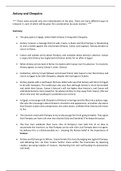Antony and Cleopatra
*** These notes provide only one interpretation of the play. There are many different ways to
interpret it, each of which will be given fair consideration by exam markers. ***
Summary
• The play opens in Egypt, where Mark Antony is living with Cleopatra.
• Antony receives a message that his wife, Fulvia, is dead, and that Pompey is threatening
to start a battle against the triumvirate (Antony, Caesar and Lepidus). Antony decides to
return to Rome.
• Caesar and Lepidus worry about Pompey, and complain about Antony’s absence. Caesar
is angry that Antony has neglected his Roman duties for an affair in Egypt.
• When Antony arrives back in Rome, he clashes with Caesar over his absence. To reconcile,
Antony agrees to marry Caesar’s sister, Octavia.
• Enobarbus, Antony’s loyal follower and closest friend, tells Caesar’s men that Antony will
return to Egypt to be with Cleopatra, despite the marriage to Octavia.
• Antony speaks with a soothsayer (fortune-teller) who says that Antony will return to Egypt
to be with Cleopatra. The soothsayer also says that, although Antony is more honourable
and noble than Caesar, Caesar’s fortune’s will rise higher than Antony’s, and Caesar will
ultimately become more powerful. He advises Antony to stay away from Caesar. (We see
that in the end, the soothsayer’s predictions are correct).
• In Egypt, a messenger tells Cleopatra of Antony’s marriage and she flies into a jealous rage.
She asks the messenger about Octavia’s character and appearance, and when she learns
that Octavia is plain and unimpressive, she calms down, confident that Antony will return
to her.
• The triumvirs meet with Pompey to try to discourage him from going to battle. They agree
that Pompey can have rule over two islands (Sicily and Sardinia) if he keeps the peace.
• The four men celebrate their truce. One of Pompey’s men tells him of an idea to
assassinate the triumvirs, so that Pompey can be sole ruler, but Pompey does not agree.
He believes this is a dishonourable act – showing the Roman belief in the importance of
honour.
• Antony and Octavia go to Athens. Caesar breaks the truce by waging war against Pompey,
and defeating him. He then creates further chaos within the triumvirate by deposing
Lepidus (accusing Lepidus of treason, imprisoning him and confiscating his possessions
and land).
, • Antony is furious at Caesar’s actions. Octavia begs him to maintain peace between them,
as she would be caught in the middle of they were to fight – does she side with her
husband, Antony, or her brother, Caesar?
• Antony tells Octavia to go back to Rome to calm Caesar down. He returns to Egypt, to see
Cleopatra and to raise an army to fight Caesar. Caesar learns that Antony has not only
abandoned Octavia for Cleopatra, but also begun making plans for war against Caesar.
Furious, Caesar raises his own troops.
• Antony is known throughout the Roman empire as the “greatest soldier in the world”. His
strength, however, is on land: on sea, he is not nearly as powerful. Despite this, and
despite numerous objections from his men, Antony decides to fight Caesar at sea. He also
agrees to let Cleopatra command a ship beside him, even though Enobarbus worries that
she will distract him.
• The battle of Actium begins. Antony and Cleopatra approach Caesar at sea, but Cleopatra
suddenly turns around and flees, taking her troops with her. Antony is forced to follow,
losing the battle.
• Antony is in despair. He mourns his lost honour, and condemns Cleopatra for fleeing the
battle. Her manipulative and powerful nature is revealed as she gets Antony to forgive her
with a mere kiss.
• Caesar is now sole ruler of the Roman empire. Antony and Cleopatra send requests to him:
Antony asks to be allowed to live In Egypt, and Cleopatra asks that her kingdom be passed
down to her children. Caesar denies Antony his request, but grants Cleopatra an
opportunity to be given hers, if she betrays Antony and sides with Caesar.
• Cleopatra appears to be considering Caesar’s message when Antony, hearing that
Cleopatra may betray him, barges in. He curses her for treachery, but within moments
forgives her again.
• Seeing Antony’s fickle nature with regards to Cleopatra, Enobarbus decides that his master
is no longer the powerful ruler he used to be, and moves to Caesar’s camp.
• Upon hearing that his most loyal friend has deserted him, Antony is devastated. However,
his virtuous character is revealed as, instead of being angry at Enobarbus, he mourns the
loss of his friend and admits that he, Antony, has lost his honour. He sends Enobarbus’s
goods and additional treasures to Caesar’s camp.
• Enobarbus is wracked with guilt over his abandonment of Antony, feeling that he does not
deserve to live, or even to die pleasantly. He dies in “the foul’st place”, a ditch, which he
believes suits his deceitful character. However, the fact that he could acknowledge his
mistakes and punish himself for them ultimately reveals his honour and integrity.
• Once again, Antony fights Caesar at sea, and once again the Egyptian fleet flees the battle.
Antony is left to suffer defeat.





